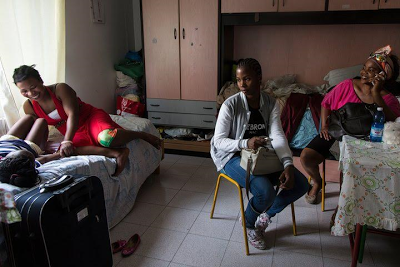Yet 17 years later she says the situation for other Nigerian women has become far worse than what she lived through. All the women on the streets of Asti have debts of more than €40,000 and most will have been forced to undergo ritual “juju” ceremonies where they have been told terrible things will happen to them and their families if they don’t repay what they owe.
“Those who leave Nigeria are told they will need to pay back €15,000 and when they reach Italy the madam tells them their debt is €45,000,” says Princess. “Or they are told they will be able to pay back the debt in three months but when they arrive they must pay rent, for their place on the street, food and other costs, so they are trapped because the debt never goes away. These traffickers use beatings and juju to fill their victims with fear,” she says. “The women believe the juju so much that I have seen women leave their traffickers and then go mad because they think the curse will come true. This is how powerful a hold it has over them.”
Mossino, who works with refugees and asylum seekers as well as victims of trafficking, says that in the past decade the trade in Nigerian women has become a hugely profitable and ruthless criminal industry, controlled largely by Nigerian gangs that took root in Italy in the 1980s.
“Every woman represents hundreds of thousands of euros to these people,” he says. “In Asti we saw 10 or 15 women a year when we started. Now we come into contact with 30 or 40 a month”
In the past women would have to be flown in to Europe with fake passports. Now they embark on the dangerous 2,500-mile journey overland through Africa and across Libya before making an equally hazardous crossing by sea to Italy on migrant boats.
In 2014 about 1,500 Nigerian women arrived by sea in Italy. In 2015 this figure had shot up to 5,633. The UN’s International Organisation for Migration (IOM) believes that 80% of these women are victims of trafficking.






































Discussion about this post